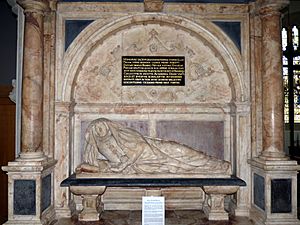Elizabeth Bacon (died 1621) facts for kids
Quick facts for kids
Elizabeth Bacon
|
|
|---|---|

Interior of St Mary's Church, Henley-on-Thames, where Elizabeth Bacon is buried
|
|
| Born | c. 1541 |
| Died | 3 May 1621 (aged 79–80) |
| Spouse(s) |
|
| Parent(s) | Sir Nicholas Bacon, Jane Ferneley |
Elizabeth Bacon (born around 1541 – died May 3, 1621) was an important English lady. Many people believe she was the "Lady Neville" mentioned in My Ladye Nevells Booke. This book is a very important collection of keyboard music by the famous composer William Byrd, put together in 1591.
Elizabeth was the daughter of Sir Nicholas Bacon. He was a powerful official for Queen Elizabeth I, known as the Lord Keeper of the Great Seal. Elizabeth's mother was Jane Ferneley. Elizabeth Bacon was married three times: first to Sir Robert D'Oylie, then to the courtier Sir Henry Neville, and finally to the judge Sir William Peryam.
Contents
Elizabeth's Family and Early Life
Elizabeth Bacon was born around 1541. She was the oldest daughter of Sir Nicholas Bacon and his first wife, Jane Ferneley. Her father was a very important person in Queen Elizabeth I's government.
Elizabeth had three brothers from her parents' marriage: Sir Nicholas Bacon, 1st Baronet, of Redgrave, Sir Edward Bacon, and Sir Nathaniel Bacon. She also had two sisters, Anne and Elizabeth.
Later, her father married again to Anne Cooke. From this marriage, Elizabeth gained two famous half-brothers: Anthony Bacon and the well-known philosopher and statesman Sir Francis Bacon.
Her Life and Marriages
Elizabeth Bacon lived an interesting life, marrying three important men.
First Marriage to Sir Robert Doyley
Elizabeth first married Sir Robert Doyley of Chiselhampton, Oxfordshire. He came from a well-known family that owned a lot of land. Sir Robert was also a member of Parliament, which means he helped make laws for the country. He was knighted in 1576.
Sadly, Sir Robert Doyley died in July 1577. He was serving as a Justice of the Peace (a local judge) at the Oxford court sessions when he and others caught a "strange sickness." This event is sometimes called the Black Assize of Oxford 1577. Sir Robert died soon after. In his will, he left Elizabeth several properties, which made her a wealthy woman on her own. They did not have any children together.
Second Marriage to Sir Henry Neville
Around May 1578, Elizabeth married Sir Henry Neville. He was her second husband. As Sir Henry's wife, she became the "Lady Nevell" linked to My Ladye Nevells Booke. This book is a famous collection of keyboard music by the composer William Byrd. For a long time, people forgot her connection to the book, but it was recently confirmed by experts. We don't know much about her own musical skills, but her interest in music is clear. Another music book was even dedicated to her!
Elizabeth and Sir Henry Neville lived in several places, including Billingbear House and Greenlands. They also had a home in London. Letters from that time show that Elizabeth was a strong person in their household. Sir Henry Neville died in January 1593. They did not have any children.
Third Marriage to Sir William Peryam
Before September 1595, Elizabeth married her third husband, Sir William Peryam. He was a very important judge, known as the Chief Baron of the Exchequer. This meant he was a chief judge in one of England's highest courts.
In 1595, a music book called The First Booke of Canzonets to Two Voyces by Thomas Morley was dedicated to her as "Lady Periam." This shows her continued connection to music. Sir William Peryam died in October 1604. Elizabeth was in charge of managing his will. She did not have any children with Sir William either.
Later Life and Legacy
In 1609, Elizabeth Bacon did something very special: she founded a charity school in Henley-on-Thames. This school helped educate children who might not have had the chance otherwise.
Elizabeth Bacon wrote her last will in November 1618. She called herself "Dame Elizabeth Periam of Greenland." In her will, she made sure there were funds for scholarships or fellowships at Oxford University. This would help students go to college.
She passed away on May 3, 1621. There is a monument in her memory at St Mary's Church in Henley-on-Thames. Many of Elizabeth Bacon's letters still exist today. These letters give us a peek into her life, including her family and how she managed her properties.
 | DeHart Hubbard |
 | Wilma Rudolph |
 | Jesse Owens |
 | Jackie Joyner-Kersee |
 | Major Taylor |

